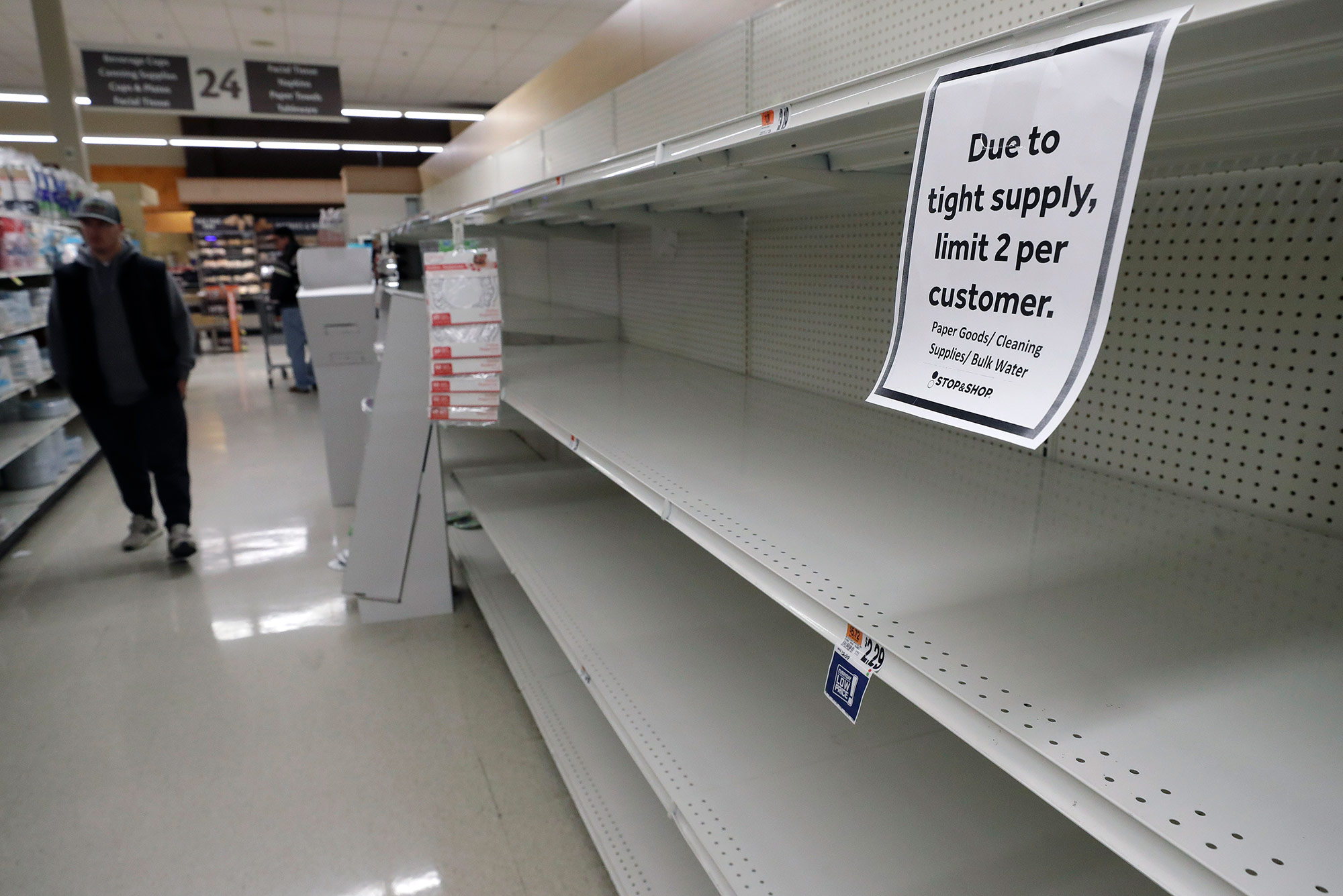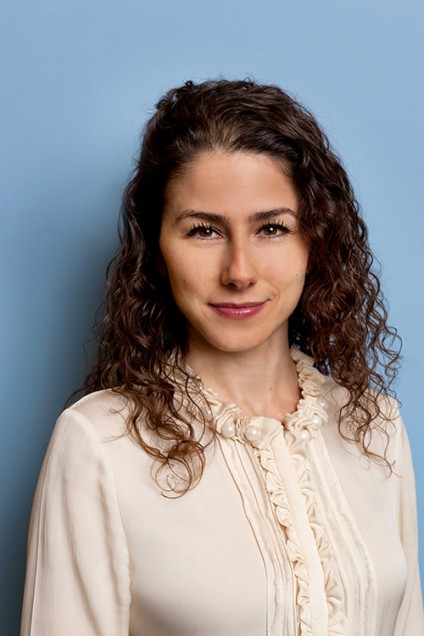Will the Coronavirus Crisis Lead to Food Shortages?

As the coronavirus has spread across America, worried shoppers have descended on stores like this one in Quincy, Mass., to stockpile pasta, bread, flour, and toilet paper. Despite the panic buying, Questrom supply chain expert Arzum Akkas is confident we won’t run out of food and other essentials. Photo courtesy of AP/Steven Senne
Will the Coronavirus Crisis Lead to Food Shortages?
A Q&A with Questrom supply chain expert Arzum Akkas, who weighs in on whether we may run out of essentials
It’s easy to freak out looking at all those empty store shelves: bread and flour are like gold dust, disinfecting wipes sold out weeks ago. And what is everyone doing with all that toilet paper?
When it comes to the impact of the coronavirus crisis on the nation’s ability to keep its markets stocked with essentials, supply chain expert Arzum Akkas isn’t panicking. A BU Questrom School of Business assistant professor of operations and technology management, Akkas studies what it takes to get a product from a farm or factory to our homes. Her recent research has focused on the supply chain and food waste: stores overstocking food and watching it expire on shelves, consumers grabbing the freshest milk and leaving older cartons to sour.
Akkas recommends keeping a “safety stock of supplies”—a few weeks’ worth of essentials, from beans and eggs to dishwashing tablets and soap.
“You just tap into it when you have to; you don’t intend to consume it,” says Akkas. “I’ve heard from the news that some people will go crazy and buy two years’ worth of soup. I don’t do that.” BU Today asked Akkas, who has degrees in supply chain management and engineering systems, whether America’s supply chains can handle the strain—and if we should all be stocking our pantries, just in case the answer is no.
Q&A
with Arzum Akkas
BU Today: Are you relaxed or nervous about our food supplies?
Arzum Akkas: I’m relaxed in the sense that I don’t think we’re going to go hungry—there’s going to be food. But I think there may be temporary shortages of certain items. When I place an order from Instacart, I don’t know if I’m going to get something or not when I order it. Sometimes a lot of items are out, but if you check it the next day, they’re back. I have friends in food distribution and they tell me they have inventory, but their bottleneck is warehouse operations. They don’t have enough people to load or drive the trucks.
BU Today: Will those problems increase as more people follow social distance recommendations or become sick?
Arzum Akkas: I was talking to another friend the other day who is on the upstream supply chain side working for a chemical company, and she said they have a lot of restrictions: if there are two lines operating next to each other, they cannot operate them together at the same time, because they need to keep the distance between two people. If they can only operate one line at a time, that is going to limit the supply. Similarly, if they reduce the number of workers in the warehouse to keep social distancing, then that means there are going to be delays in shipments. So, if every manufacturing company is taking these precautions, we’re going to have supply issues in a month or so. Why in a month? Because we are still consuming through the pipeline inventory that was already in the supply chain.
BU Today: How much does panic buying make things worse?
Arzum Akkas: From what I’ve read, panic buying has increased the sales by four times at grocery stores—that’s a record high. In the past, sales might double before a snowstorm; a hurricane sometimes triples them. We’ve never seen this much demand spike. But we don’t need to panic. I expect occasional delays—and more production problems and shortages—but we’re not going to run out of food. We’ll have to substitute: you may not find your favorite brand, but there are going to be similar products.

BU Today: Other countries have started restricting exports of food. Will that start impacting us here or does America have a fairly robust supply chain?
Arzum Akkas: We have a lot of waste. Have you noticed any ugly looking produce at the grocery store? No, right? That’s not a coincidence. A significant chunk of produce does not make it to the market because it doesn’t look pretty. Maybe we’re going to have to eat ugly looking carrots down the road, but we’re never going to go hungry.
BU Today: Do you think this is going to bring lasting changes to our attitudes about certain foods or perhaps change the way we shop in the future?
Arzum Akkas: This is not going away in a week; we’re going to experience it deeply. I think it’s going to impact our behavior in the future. You’re going to appreciate leftover food that you’d maybe normally throw away. I think people are going to be less wasteful in the future.
BU Today: Are there any products that may become hard to find?
Arzum Akkas: The more processed food is, the more you may run into supply issues, but if you eat more natural stuff, I think there is less risk. I tried to find hair conditioner and I couldn’t. I have a little bit of safety stock on that—and dishwashing detergent and bar soap—because I think we’re going to have some supply chain issues with chemicals. The simpler the recipe of a product or ingredient, the higher likelihood it will be in the market. Companies like Procter & Gamble, PepsiCo, and Clorox are worried about chemical supplies. I don’t have hand sanitizers or Clorox—I cannot find them anymore. Thankfully, I had some bleach, which is what I’ve been using.
BU Today: Why are chemical supplies a particular problem?
Arzum Akkas: The supply chain is more global: everybody buys from each other across the continents. My friend in the chemical industry is in Europe, but has suppliers from China and the United States; now they cannot get chemicals from other continents and they’re limited to only European suppliers. So, for more durable [or complex] items, supply chains are more global and more intertwined; for fresh foods, it’s not as complex. If you’re missing one item or one ingredient in a complex product, what do you do? You either cannot make the item or you have to find an alternative recipe.
BU Today: Finally, the big question, should we worry about running out of toilet paper?
Arzum Akkas: Absolutely not. We do not eat toilet paper. There are alternative solutions to toilet paper. Also, the United States has plenty of paper resources.

Comments & Discussion
Boston University moderates comments to facilitate an informed, substantive, civil conversation. Abusive, profane, self-promotional, misleading, incoherent or off-topic comments will be rejected. Moderators are staffed during regular business hours (EST) and can only accept comments written in English. Statistics or facts must include a citation or a link to the citation.